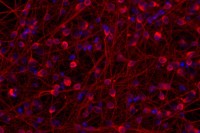
MSK Researchers Hack Neurons’ Internal Clocks To Accelerate the Study of Neurological Diseases
New research led by MSK has uncovered a way to “hack” neurons' internal clocks to speed up their development. The approach promises to accelerate research into neurological disease.
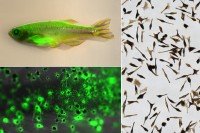
Why Are Only Some Cells ‘Competent’ to Form Cancer? MSK Scientists Say Context Is Key
Experiments with zebrafish and human pluripotent stem cells reveal the necessary ingredients, besides genetic mutations, that fuel the development of melanoma.
Q&A

Taking Aim at Parkinson’s Disease: A Conversation with Developmental Biologist Lorenz Studer
In an interview in September 2020, Dr. Studer spoke about what he hopes he and his fellow investigators can accomplish with this generous support.
Announcement
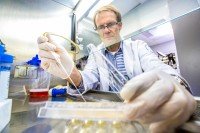
MSK’s Lorenz Studer Named a 2015 MacArthur Fellow
The awards are given annually to people in an array of fields in the arts and sciences.
In the Lab
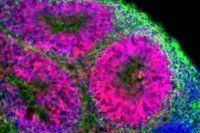
Stem Cell Research Identifies Potential Drugs for Treating Zika Infection
Researchers from MSK and Weill Cornell have found that two compounds appear to fight off infection with the Zika virus.
In the Lab
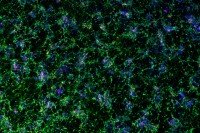
A 'Quick-and-Easy' Recipe for Making Brain Cells
Using stem cells, scientists can create batches of cortical neurons to study schizophrenia and autism.

At Work: Center for Stem Cell Biology Director Lorenz Studer
Lorenz Studer is excited by the power that embryonic stem cells hold for treating disease as well as repairing damage caused by cancer therapy.
In the Lab
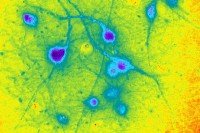
Seeing the Light: How Engineered Nerve Cells Might Curb Parkinson’s Disease
A new tool called optogenetics is revealing clues about the function of a promising experimental therapy derived from stem cells.
In the Lab
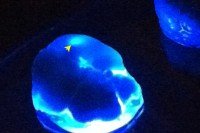
Genetic “Kill Switch” Could Make Cell Therapies Safer
Researchers have engineered a gene into therapeutic cells that allows them to turn off tumor growth if some of the cells become cancerous.

Physician-Scientists Viviane Tabar and Lorenz Studer Elected to the American Society for Clinical Investigation
Two Memorial Sloan Kettering physician-scientists were elected to one of the nation’s oldest and most respected medical honor societies.
In the Lab
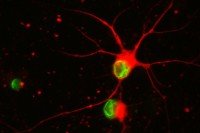
Researchers Fast-Forward Stem Cell Aging to Study Degenerative Diseases
A team of Memorial Sloan Kettering scientists has come up with an approach to make stem-cell-derived neurons rapidly age in a cell culture dish. The breakthrough could transform research into Parkinson’s and other late-onset diseases.
Snapshot
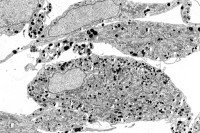
Pigment-Producing Skin Cells Generated Using Stem Cell Technology
Memorial Sloan Kettering researchers have developed innovative ways to study some skin diseases, including melanoma skin cancer.

Human Stem Cells Treat Parkinson’s in Mice
New research published in Nature by Sloan Kettering Institute developmental biologist Lorenz Studer describes how stem cells from human embryos were us...
Induced Stem Cells Promise 'A Whole New Way To Do Medicine'
Developmental biologist Lorenz Studer, MD, discussed research his laboratory is conducting on familial dysautonomia (FD)....
Q&A

Developmental Biologist Lorenz Studer Comments on the 2012 Nobel Prize in Physiology or Medicine
Methods to generate stem cells have given scientists new ways to study some diseases and identify potential drugs, and could one day be used to rebuild diseased or damaged tissues in patients.
From the 2011 Annual Report
Novel Stem Cell Technique Shows Promise in Treating Disease
Cell replacement therapy seeks to restore function in the body by replacing cells that are lost due to disease or injury with new, healthy cells. One disease for which this type of therapy holds particular promise is the degenerative neurological disorder Parkinson’s disease, which is characterized by symptoms related to movement.
Memorial Sloan Kettering Team Develops Tool to Advance Stem Cell Research
Investigators at Memorial Sloan Kettering have developed a new tool that could help them advance the understanding of human embryonic stem cells.
Therapeutic Cloning Treats Parkinson's Disease in Mice
Research led by investigators at Memorial Sloan Kettering Cancer Center has shown that therapeutic cloning, also known as somatic-cell nuclear transfer (SCNT), can be used to treat Parkinson's disease in mice.

Team Creates Muscle Cells from Embryonic Stem Cells
A team of Memorial Sloan Kettering investigators has reported for the first time a novel strategy to coax human embryonic stem cells (HESCs) to develop into cells that could potentially be used to repair the musculoskeletal system, including bone, cartilage, and muscle.
Research Shows Therapeutic Cloning Can Cure Parkinson's-like Disease in Mice
NEW YORK, September 21, 2003 - New research from Memorial Sloan Kettering Cancer Center (MSKCC), Cornell University, and The University of Connecticut describes a novel way of producing therapeutic nerve cells that can cure mice with Parkinson's-like disease. The work, which will be published in the October issue of Nature Biotechnology (available online September 21), provides the first evidence that cloned cells can cure disease in an animal model.















